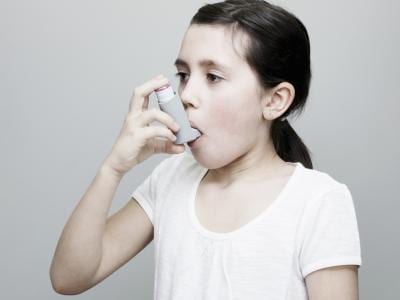Allergies and asthma are relatively common conditions in children. Millions of Americans, both adults and children, suffer from allergies, according to KidsHealth, while up to 20 percent of children suffer from asthma. Asthma can be caused by outside irritants, such as smoke, or it can be caused by the same allergens that cause allergies, such as pet hair and pollen.
Causes
Allergies are caused by triggers that set off an abnormal immune response, according to MayoClinic.com. For instance, whenever a child who is allergic to dust, pollen or mold, inhales those particles, her immune system produces antibodies that fight the invaders and result in allergy symptoms, even though the particles are not something that will cause harm to the body. In some children, exposure to an allergen can trigger an asthma attack, due to the heightened immune response in the respiratory tract.
Symptoms
Allergy symptoms can vary. Many children experience allergic rhinitis, or hay fever, from airborne allergies, according to MayoClinic.com and KidsHealth. Rhinitis symptoms resemble a cold and include a runny nose, congestion and coughing. Some children may have swollen, red eyes as well. A child with asthma may have trouble catching his breath and may wheeze and feel chest tightness and pain. His chest may feel tight, and he may cough frequently.
Treatment
Many children with asthma use a rescue inhaler to treat and relieve symptoms during a flare-up. Some also take a controller medication every day to prevent asthma flare-ups, according to KidsHealth. If your child’s asthma is caused by allergens, you may treat both with allergy shots or pills. Another way to treat allergies and asthma caused by allergens is to avoid the triggers, such as pollen and cat dander, as much as possible.
Coping with Asthma
An asthma attack may be a terrifying experience for a child, so it is a good idea to have a support plan in place, according to MayoClinic.com. As soon as the child is old enough to understand, be up front with him about what causes his asthma and what he should do if he experiences an attack. Although your first instinct may be to shelter him from anything that can lead to a flare-up, your best option may be to work with his doctor to find ways he can participate in activities and sports safely.
Other Types of Allergies
Not all allergies are airborne and lead to respiratory ailments. Certain foods, such as milk, peanuts and wheat, can cause allergic reactions in children. Food allergies usually cause hives to appear on the skin. The reactions can become very serious, very quickly. Some children may go into anaphylactic shock, according to KidsHealth. During shock, the child may struggle to breathe as her throat, lips and face swells. The best way to treat such allergies is to avoid the allergen. Some children may need to carry injectable epinephrine with them, which quickly relieves an allergic reaction.





